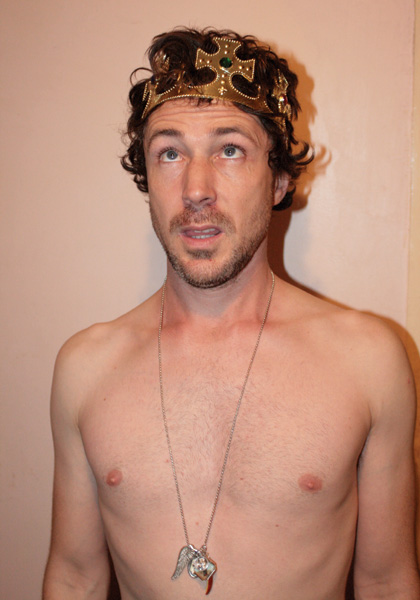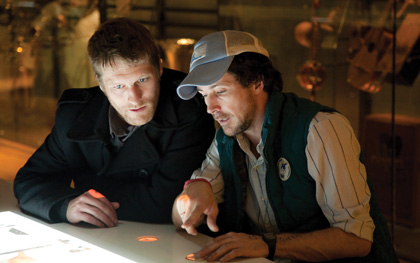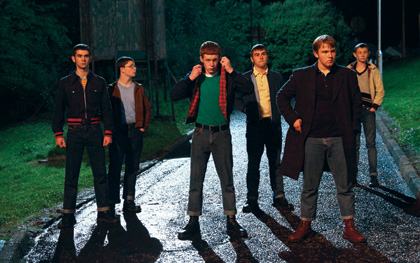Festivals
London Film Festival 2010: The S&S blog
Off the rails: Jamie Thraves’ Treacle Jr.
and Peter Mullan’s Neds

Aidan Gillen in Treacle Jr.
Nick Bradshaw, 24 October
“In Britain,” wrote Jonathan Romney in our LFF-special November issue, “new filmmakers may get the chance to prove they can direct. But very few find the opportunity to show they might have the makings of an auteur – that is, to display a consistency of thought and style to be explored in depth over several films.”
Romney was celebrating the seeming exception of Joanna Hogg – although, talking at the festival filmmakers’ tea on Saturday, she says the gap between her slow-born debut Unrelated and the new Archipelago was in fact longer than the three years’ difference in the registration dates. Still, other British talents go missing for much longer, and not because they want to be Terrence Malick. I caught up with a couple in the festival which we’d not managed to see in time to preview in the aforementioned ‘British Invention’ special issue.
Peter Mullan’s Neds is his first directorial feature since 2002’s scathing Venice-winner The Magdalene Sisters. Jamie Thraves finally followed up his sparkling 2000 debut The Low Down with last year’s comprehensively neglected Patricia Highsmith adaptation The Cry of the Owl, a brooding and frequently fascinating genre experiment starring Paddy Considine and Julia Stiles that perhaps wanted for a little more assurance or fluency. He’s managed the faster turnaround on his self-produced third film, Treacle Jr., by remortgaging his house, pulling in favours and hiring his cast and crew on deferred fees: the sort of no-budget recourse that used to be recommended as a career launchpad, but may be increasingly be the future of auteurist filmmaking, at least if producers can find a way to make it pay.
Both films turned up in London fresh with prizes from abroad, Neds having won the Golden Shell at San Sebastian, while Treacle Jr. shared the Golden Hitchcock with Made in Dagenham at the Dinard British Film Festival. And both probe the inner turmoil of shuttered characters as they careen dramatically off the straight and narrow.

I got a wife and kids in Baltimore, Jack
I went out for a ride and I never went back…
— Bruce Springsteen, Hungry Heart
Treacle Jr. starts with Tom (Graham Chapman ringer Tom Fisher) setting out like on any other commuting day, kissing his wife and childhood goodbye and driving from his semi-detached home to the train station (Birmingham New Street). Getting off at Euston, he finds a quiet pavement corner and flops down on the street; later flirts with the notion of binning his wallet and family photo therein; and come nightfall is forced to flee a gang of gay-bashers by running into the only tree in the park.
Which brings him the next day to A&E and the attentions of Aidan (Aidan Gillen), a happy-go-lucky, voluble extrovert who wears a button-covered blazer and baseball cap and lisps like an Irish Donald Duck. (“You know what I’d just love right now? A hot bitch. The sun, the sky…”) Tom himself may want to be an island at this point, but of course Aidan sticks to him, offering him shelter and prattling company until Tom starts to thaw.
Gillan’s outré turn (offering door-to-door hedge-cutting services with a pair of scissors, one-downing The White Stripes at a drum kit et al), a restrained whimsicality and and a slow-burn consideration of Tom’s unease all put some meat on the story’s bones. What also enriched things was the presence of Aiden’s live-in non-lover Linda (Riann Steele), a soot-hearted bully as troubled as any of them (in fact she probably warranted more exploring), who knocks Aidan around but can’t quite knock him down.
She helps pull the film away from the familiar redemptive odd-couple refrains of The Fisher King et al, and shifts the personal and sociological balance towards she and Aidan’s London world. Thraves describes Aidan the most optimistic character he could imagine – he comes up giggling when Linda hits him – and the film, notwithstanding a couple of cute movie-ish moments, is another incisive portrait of unexpected encounters and individual power dynamics to sit with Thraves’ previous films.

Conor McCarron (second from right) in Neds
Neds is madder. For a long time it looks like being a similar tale of personal fall and recovery, not to mention the best slice of 1970s Glaswegian council-estate realism since Ratcatcher (1999), and before that Gillies Mackinnon’s Small Faces (1995): it follows young blue-collar A-student John McGill (Gregg Forrest, and later Conor McCarron), whose elder brother’s gang infamy precedes John, as he spurns his academic promise for the greater satisfactions of fighting, teacher-baiting, and wreaking vengeance on his drunken father (Mullan himself) and rival gang members alike.
The closed and petty viciousness of the school system, teen culture, right-side-of-the-tracks families, sink-estate architecture and just about every male role model in this exceptionally masculine film are all scrupulously charted. Even then, John himself is a untameable force of nature, progressively terrifying even his newfound gang pals with his extreme fearlessness, will to revolt and ready recourse to violence. (Mullan denies that the film is precisely autobiographical, but the alienation of being an over-achiever in a culture of low expectations is clearly an experience he knows.)
As in both Ratcatcher and Mullan’s earlier films, there are surreal flights of fantasy: a down-for-it Jesus, a Glaswegian lion pack. And like John himself, the film seems quite untamed – it just keeps going. Which in this milieu may be the most optimistic thing you could imagine.
« Uncle Boonmee Who Can Remember His Past Lives
Two very different sporting documentaries »
See also
London Film Festival 2010: 30 recommendations (online, October 2010)
Reasons to be cheerful: Ryan Gilbey celebrates a crop of bad-mannered new British films (October 2002)
Ratcatcher reviewed by Charlotte O’Sullivan (November 1999)
Orphans reviewed by Edward Lawrenson (May 1999)
